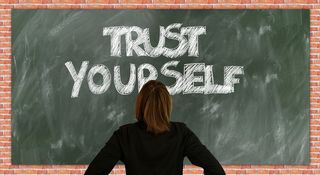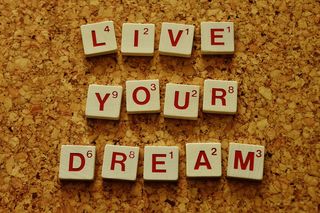Nothing ventured, nothing gained.” (English proverb)
Obviously, the answer to the question in my title is subject to debate. But what I’d like to suggest here is that the farthest-reaching paradox about human nature and its powerful defense system is this: Most of us try to control life by protecting ourselves from it. Rather than “going for it”—living life as the indomitable adventure it is—we too often decide it’s better to be cautious, to hold ourselves back. Employing all sorts of personal prohibitions, we minimize risks by “disciplining” many of our natural impulses. And we demonstrate a strong tendency to resist change. Our self-protective stratagems, however unconscious, are all designed to shield us from failure and rejection—not to mention, anxiety and fear, sorrow and grief, humiliation and shame.
This inherent predisposition toward avoidance is even more likely if we experienced significant abuse in childhood. Having endured such painful experiences prompts us to develop a variety of defenses to safeguard a vulnerability which, back then, overwhelmed us. And that’s truly unfortunate since as we grow older, we’re given all sorts of opportunities—if we have the courage to take them—to cultivate resources that can greatly reduce this earlier, so keenly felt vulnerability.
A complementary paradox here is that not taking risks might well be the greatest risk of all. In our self-inhibiting cautiousness, we hazard depriving ourselves of all the wonderfully novel, creative, and gratifying involvements that emerge only through giving ourselves the permission to drop our guard and be spontaneous. But in not trusting ourselves—or in life itself—such distrust can harden to the point of irreversible obstinacy or intransigence. And, in theory at least, who wouldn’t agree that life is best approached with an open-minded flexibility, vs. an unyielding rigidity.
Ultimately, the price you pay for an unwillingness to engage head-on with what originally overwhelmed your limited coping resources can be enormous. And, too, consider that you can’t grow your resilience, and by doing so expand your possibilities for a rich, fulfilling life, if you put most of your effort into evading life’s difficult challenges. Though certainly understandable, taking such a reticent position leads you not so much to live life—to courageously remain open not only to its excitement and joys, but also to its various hurts and frustrations—so much as, self-protectively, to shut yourself off from it.
Admittedly, such a wary stance does enable you to escape some of life’s uncertainties and pitfalls. But it’s nonetheless a cop out, preventing you from vitally grappling with existence and learning how to triumph over (or at least adjust to) life’s inevitable threats and obstacles. For every hindrance you’re willing to confront offers you the precious opportunity to conquer your fears, extend your capabilities, and transcend limits that may now exist far more in your mind than in present-day reality.
Such confrontation also links to the adage “practice makes perfect.” We can back out of a task, project, or relationship because we worry it might eventuate in failure or rejection. But if we determine to give it—whatever it is—our maximum effort, to not “safely” hold ourselves back, we’ll greatly increase our chance of eventual success. By extending our reach we may well grasp what, much earlier, may have been impossible for us. Quite likely we’ll be able to accomplish what that insecure child part of us prematurely concluded was forever beyond our grade level. And even if we don’t succeed, we can still be proud of ourselves for showing the courage to go “all out” for what we wanted. (And here, it might be useful to review an earlier three-part post of mine entitled: “The Power to Be Vulnerable.”)
 Unconsciously, we may question whether, should life beat us down, it might not be advantageous to stay down. But in the great majority of instances, people do recover from disappointments and defeats, sometimes even despite themselves. So the worst thing we can do is to remain down, so that no person or thing can ever knock us over again. And this negative thinkingderives much more from that scared-to-inaction “inner child” than to our adult self, able to realize that—as an adult—we no longer need be governed by the sense of powerlessness we may have experienced so acutely in growing up in difficult circumstances.
Unconsciously, we may question whether, should life beat us down, it might not be advantageous to stay down. But in the great majority of instances, people do recover from disappointments and defeats, sometimes even despite themselves. So the worst thing we can do is to remain down, so that no person or thing can ever knock us over again. And this negative thinkingderives much more from that scared-to-inaction “inner child” than to our adult self, able to realize that—as an adult—we no longer need be governed by the sense of powerlessness we may have experienced so acutely in growing up in difficult circumstances.
More than anything else, resilience is exactly what we require to thrive in life. And this is hardly about abandoning all discretion or prudence. It’s simply about not automatically backing away from anything which, in the moment, raises our anxiety level because it reminds us of earlier situations that left us feeling defenseless, afraid, or ashamed.
Source: Pixabay/CCO Creative Commons
 It’s one thing to be circumspect (that, after all, is only wise), and quite another to have become anxiously hyper-vigilant or over-sensitive to possibly adverse consequences. When cautiousness begins to consume our creative energy, it compromises our ability to solve problems and get ahead in life. It renders us victim to out-of-date emotions that keep us from effectively asserting ourselves, and advancing our dreamsSo, to add another complementary paradox, if you can surrender to the fact of your—and everybody’s else’s—vulnerability, recognizing that regardless of the outcome you’ll almost certainly survive, you’ll then experience yourself as less vulnerable. On the contrary, the more energy you put into protecting yourself from uncomfortable feelings of jeopardy, the more vulnerable you’ll end up feeling.
It’s one thing to be circumspect (that, after all, is only wise), and quite another to have become anxiously hyper-vigilant or over-sensitive to possibly adverse consequences. When cautiousness begins to consume our creative energy, it compromises our ability to solve problems and get ahead in life. It renders us victim to out-of-date emotions that keep us from effectively asserting ourselves, and advancing our dreamsSo, to add another complementary paradox, if you can surrender to the fact of your—and everybody’s else’s—vulnerability, recognizing that regardless of the outcome you’ll almost certainly survive, you’ll then experience yourself as less vulnerable. On the contrary, the more energy you put into protecting yourself from uncomfortable feelings of jeopardy, the more vulnerable you’ll end up feeling.
Psychologically speaking, this makes perfect sense. For every time you act—or don’t act—to lessen your (supposed) vulnerability, you reinforce outdated notions about your ability to contain, or keep in check, distressing emotions. That is, if to escape the onset of anxiety, hopelessness, or humiliation, your m.o. is to shy away from taking risks, that ”programmed” avoidance will only heighten your helpless reaction the next time you need to tackle something whose outcome is uncertain.
Still, if in advance you determine you can accept, or adapt to, whatever result your action might lead to, you’ll experience more control than if you simply evaded the situation. (And here, see three previous posts of mine closely connected to this one: "How Vulnerable Should You Let Yourself Be?", “Surprise! Your Defenses Can Make You MORE Vulnerable,” and “Better Sorry Than Safe?”.)
As a barker at a midway might proclaim: “You pays yer money and you takes yer choice.” But here it’s not about taking the chance to win a particular prize (where the odds are routinely stacked against you—as in, sooner or later, “the House always wins”). It’s the choice between living a life that’s rich and meaningful—creative, nurturing, vibrant, and exciting— vs. settling for one that may be safe and secure but which is mostly static, dull, empty, or unrewarding. and aspirations, in the present.
As the both deaf and blind Helen Keller so famously put it: “Life is either a daring adventure or nothing.”
So, in that—finally—it’s your life to live, what’s your choice?
© 2018 Maria F. Ph.D. All Rights Reserved.
No comments:
Post a Comment